Juho Pohjalainen's Blog: Pankarp, page 4
June 30, 2020
Grimdark, Noblebright, Little People, Big Stories
Warhammer 40,000 is one of the most relentlessly bleak and horrific fictional settings ever imagined. It's an endless war that dominates the entire galaxy, and has virtually every life revolving around it one way or the other. Even the afterlife was corrupted by it, many millions of years ago, completely beyond repair: the spiral into final death and darkness cannot be stopped or slowed down, and in the end they're all doomed.

This often raises a question: why then should you care? If everybody is doomed anyway, what's the point? The usual answer - it's the people, the individuals. The few precious lives whom you can save, or protect, or destroy. They're in peril, and you're in position to help. And if you do, they may live the remainder of their natural lives in relative happiness and peace and comfort. And that's something you should always cherish, and always fight for. You can't solve the grand underlying problems of the world - no one can - but you can do your share to help somebody. Every life is precious.
So now my mind drifts on: what about the opposite?
My own setting is as bright and hopeful as I can make it - a golden age of high adventure where I myself would not mind living. If a grimdark setting is a bleak reflection of our world and a reminder that things can always be better, then I guess a noblebright one is more of escapism and wish fulfillment with perhaps a dash of hope for a better future. In the former case you can't do anything to make things better in the grand scheme of things; in the latter, you don't really need to.

But we're still not looking for any sweeping great reforms: we're looking at the little folks. And because nothing can ever be perfect - especially not mankind with our flaws and sins - they're still menaced and victimized, their lives and livelihoods in danger. The reader still feels their plight, and once the hero has come around to save them, their gratitude.
I guess the takeaway here is that the setting doesn't really have too much of a relevance, in the grand scheme of things. It's big and imposing and scary, but it's the little things you want to focus on. Maybe that's no big news to anyone here, but then again... lately, Warhammer's been pulling the lens back and covering the entire setting, bringing forth grand changes and raising the stakes. Things are coming to a head. It feels like it might be End Times all over again.
And I'm really not a fan. The older I get, the tougher time I have getting into these vast, galaxy-wide conflicts. They feel... hollow.
But I also understand that Games Workshop needs to sell more models.
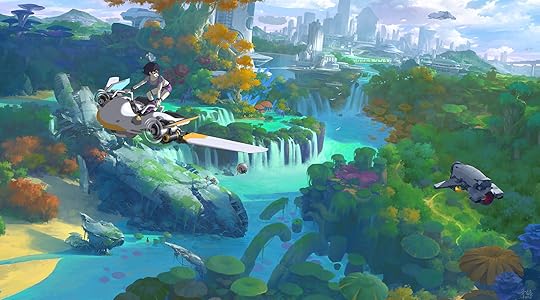

This often raises a question: why then should you care? If everybody is doomed anyway, what's the point? The usual answer - it's the people, the individuals. The few precious lives whom you can save, or protect, or destroy. They're in peril, and you're in position to help. And if you do, they may live the remainder of their natural lives in relative happiness and peace and comfort. And that's something you should always cherish, and always fight for. You can't solve the grand underlying problems of the world - no one can - but you can do your share to help somebody. Every life is precious.
So now my mind drifts on: what about the opposite?
My own setting is as bright and hopeful as I can make it - a golden age of high adventure where I myself would not mind living. If a grimdark setting is a bleak reflection of our world and a reminder that things can always be better, then I guess a noblebright one is more of escapism and wish fulfillment with perhaps a dash of hope for a better future. In the former case you can't do anything to make things better in the grand scheme of things; in the latter, you don't really need to.

But we're still not looking for any sweeping great reforms: we're looking at the little folks. And because nothing can ever be perfect - especially not mankind with our flaws and sins - they're still menaced and victimized, their lives and livelihoods in danger. The reader still feels their plight, and once the hero has come around to save them, their gratitude.
I guess the takeaway here is that the setting doesn't really have too much of a relevance, in the grand scheme of things. It's big and imposing and scary, but it's the little things you want to focus on. Maybe that's no big news to anyone here, but then again... lately, Warhammer's been pulling the lens back and covering the entire setting, bringing forth grand changes and raising the stakes. Things are coming to a head. It feels like it might be End Times all over again.
And I'm really not a fan. The older I get, the tougher time I have getting into these vast, galaxy-wide conflicts. They feel... hollow.
But I also understand that Games Workshop needs to sell more models.

Published on June 30, 2020 06:54
•
Tags:
grimdark, heroes, little-people, noblebright, settings
June 24, 2020
Peal is Not Human - a mind map
I've said before that I like it when the nonhuman races and creatures are depicted as legitimately alien, rather than just regular folks with pointy ears and a bit of fur and what have you. As an experiment, I put up a mind map about all the ways Peal's nonhumanity affects his character. I was delighted when I could trace just about all of him to him being what he was.

Here is the full thing if you'd like to learn more of him. Truthfully it ended up as a bit of a mess.

Here is the full thing if you'd like to learn more of him. Truthfully it ended up as a bit of a mess.
Published on June 24, 2020 11:21
•
Tags:
aliens, bugbears, fantasy, fantasy-races, inhumanity, mind-map, mind-maps, peal
June 19, 2020
Sex scenes - what are they good for?
I haven't written very many instances of two characters hotly and sweatily getting it on, and in the few instances that I have, I've always ended up cutting them off the stories by the next draft. I think I have a fairly good idea why.

It has no plot-relevance, almost ever. There's no reason to actually show any of it. All the demonstration of the characters loving one another can be shown before and after, with kisses and cuddles and other such stuff. Any notion of someone getting pregnant - an eminently plot-crucial event - can be assumed to have happened off-screen. Sometimes a character might be a different sort of a lover than you'd think, either rougher or more gentle or less experienced or whatever than would have been expected, but this too is rarely crucial enough to be given any more attention than someone off-handedly mentioning it afterwards.
The act itself serves not the story, but the audience. It's here to titillate us, or to show us how hot and daring the author is, or what an amazing lover the main character is. Things to get a reaction out of us. To keep us turning the pages even though the story at this moment is paper-thin, purely by appealing to our basest urges. It feels rather a low-hanging fruit to me.
But as with every rule, there's exceptions. And the one I can think of here is bad sex.
Bad sex can actually drive the plot. It will bring forth new character flaws to overcome, unexpected conflict between two people that at this point should rather like one another, a small story arc with a real pay off. It'll get the reader's sympathy - something I always felt was more important than wish-fulfillment. It can even tie to the greater story, to demonstrate a character's rising (ha!) confidence and getting through their personal issues. Then you can even show the good sex, as a bit of contrast and as demonstration that they're getting better.
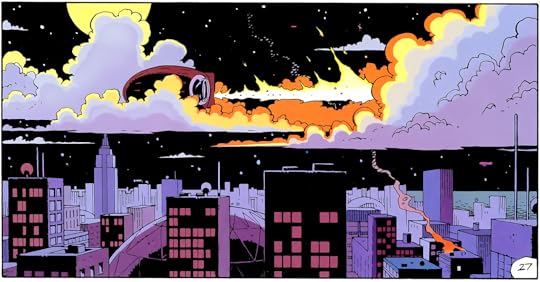
I guess there's a scene such as this in my mind that I'd get to writing sooner or later, but mostly I bring it up now because certain revelations in the video gaming community have prompted me. If you follow the gaming news, perhaps you know what I'm talking about.

It has no plot-relevance, almost ever. There's no reason to actually show any of it. All the demonstration of the characters loving one another can be shown before and after, with kisses and cuddles and other such stuff. Any notion of someone getting pregnant - an eminently plot-crucial event - can be assumed to have happened off-screen. Sometimes a character might be a different sort of a lover than you'd think, either rougher or more gentle or less experienced or whatever than would have been expected, but this too is rarely crucial enough to be given any more attention than someone off-handedly mentioning it afterwards.
The act itself serves not the story, but the audience. It's here to titillate us, or to show us how hot and daring the author is, or what an amazing lover the main character is. Things to get a reaction out of us. To keep us turning the pages even though the story at this moment is paper-thin, purely by appealing to our basest urges. It feels rather a low-hanging fruit to me.
But as with every rule, there's exceptions. And the one I can think of here is bad sex.
Bad sex can actually drive the plot. It will bring forth new character flaws to overcome, unexpected conflict between two people that at this point should rather like one another, a small story arc with a real pay off. It'll get the reader's sympathy - something I always felt was more important than wish-fulfillment. It can even tie to the greater story, to demonstrate a character's rising (ha!) confidence and getting through their personal issues. Then you can even show the good sex, as a bit of contrast and as demonstration that they're getting better.

I guess there's a scene such as this in my mind that I'd get to writing sooner or later, but mostly I bring it up now because certain revelations in the video gaming community have prompted me. If you follow the gaming news, perhaps you know what I'm talking about.
Published on June 19, 2020 04:21
•
Tags:
bad-sex, berserk, good-sex, sex-scenes, sympathy, titillation, watchmen, wish-fulfillment
June 12, 2020
What is dead can never die... or can it? I don't know
Peal has died once so far. Gone beyond the veil, yet come back thanks to a quick medical intervention. He doesn't recall much of the experience.

According to my notes he's going to go through this sort of a thing at least once more, possibly twice, before it finally sticks.
Here's the question: does this give him any power over Death? Does it mean he can avoid its cold grasp and keep himself alive through even the worst of it?
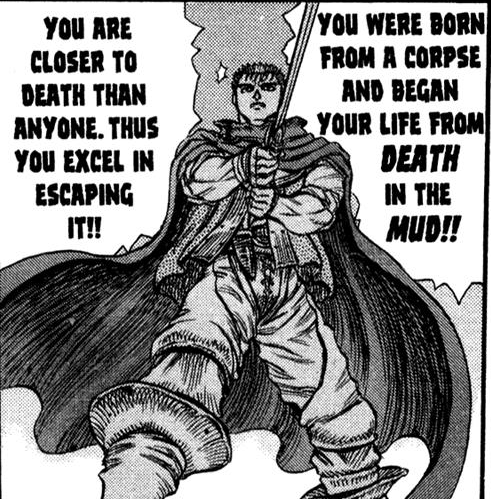
Or does it mean Death is really pissed off at him and will take special interest in him, make sure that he dies and stays dead, Final Destination style?
That's the nice thing about writing fantasy. Either one could be true. Or neither.

According to my notes he's going to go through this sort of a thing at least once more, possibly twice, before it finally sticks.
Here's the question: does this give him any power over Death? Does it mean he can avoid its cold grasp and keep himself alive through even the worst of it?

Or does it mean Death is really pissed off at him and will take special interest in him, make sure that he dies and stays dead, Final Destination style?
That's the nice thing about writing fantasy. Either one could be true. Or neither.
Published on June 12, 2020 04:18
•
Tags:
avoiding-death, cheating-death, coming-back-to-life, death, drowning, dying, game-of-thrones, raise-dead
June 6, 2020
Evil
Virtually every human since the dawn of time has had their own definition for "Evil". Personally I like to pull the scope back a little - focus on the entire forest rather than individual trees, onto the label itself and those that would throw the word around.

The way I define "Evil" is a splash of vomit on your carpet.
You can argue about what exactly it smells like, and just what all those chunks in it are made out of. You can debate over the best way to scrub the carpet clean, and whether the carpet itself can be salvaged afterwards. You'll be reminded of the times before someone threw up, and you won't take those times for granted again if or when they come back. You might raise the question of who threw up to begin with, and whether they're seriously ill or just hungover. Indeed, some of the wiser of us may point out that each of us might barf out like this, under the right circumstances: none of us is free of stink.
All these things are what people like to talk about, but the more pertinent truth remains: it has to go. It has no value whatsoever, no redeeming qualities, no reason anyone should endure its presence. It stinks up the entire house. Somebody throws up, the whole house will go to emergency mode to clean it up and to make sure no more comes out.
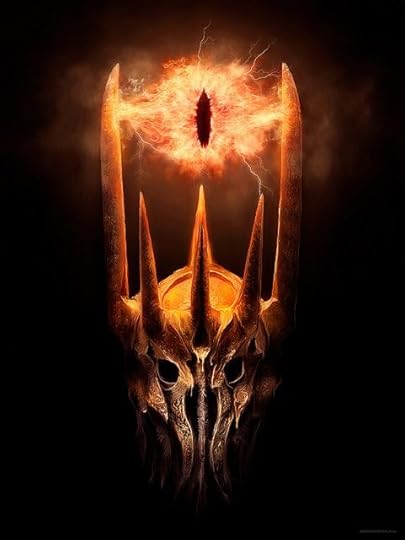
So by labeling something as "evil" you make an objective, inarguable, unambiguous statement that they're the absolute scum of the earth with zero redeeming qualities, and have to be disposed of immediately. There can be no "balance between good and evil": any evil at all is too much. There can be no redemption or salvation: all you can do is wipe it away. This is very strong language and, needless to say, not to be used lightly.
One thing I'm glad of with modern fantasy literature is that it indeed uses this sort of terminology much less casually than it used to. I myself prefer the much more morally-grey Order and Chaos. But there are still places where the word can be worth throwing around. Sometimes you really just need to get rid of something.

Sometimes you really are just fighting a great big pile of puke.

The way I define "Evil" is a splash of vomit on your carpet.
You can argue about what exactly it smells like, and just what all those chunks in it are made out of. You can debate over the best way to scrub the carpet clean, and whether the carpet itself can be salvaged afterwards. You'll be reminded of the times before someone threw up, and you won't take those times for granted again if or when they come back. You might raise the question of who threw up to begin with, and whether they're seriously ill or just hungover. Indeed, some of the wiser of us may point out that each of us might barf out like this, under the right circumstances: none of us is free of stink.
All these things are what people like to talk about, but the more pertinent truth remains: it has to go. It has no value whatsoever, no redeeming qualities, no reason anyone should endure its presence. It stinks up the entire house. Somebody throws up, the whole house will go to emergency mode to clean it up and to make sure no more comes out.

So by labeling something as "evil" you make an objective, inarguable, unambiguous statement that they're the absolute scum of the earth with zero redeeming qualities, and have to be disposed of immediately. There can be no "balance between good and evil": any evil at all is too much. There can be no redemption or salvation: all you can do is wipe it away. This is very strong language and, needless to say, not to be used lightly.
One thing I'm glad of with modern fantasy literature is that it indeed uses this sort of terminology much less casually than it used to. I myself prefer the much more morally-grey Order and Chaos. But there are still places where the word can be worth throwing around. Sometimes you really just need to get rid of something.

Sometimes you really are just fighting a great big pile of puke.
Published on June 06, 2020 03:00
•
Tags:
definition, earthbound, evil, good-and-evil, hangovers, master-belch, morality, terminology, vomit
June 3, 2020
Who's writing this down again? Narrator identity, perspective, and bias
These past few years I've become increasingly convinced that the narrator should always be a character within the confines of the story, even when it's not told in first person. Someone had to record all these events for the later generations to read, after all. And that someone can't be just me, as I was never there to witness it. Otherwise I might as well be making it all up. Right?
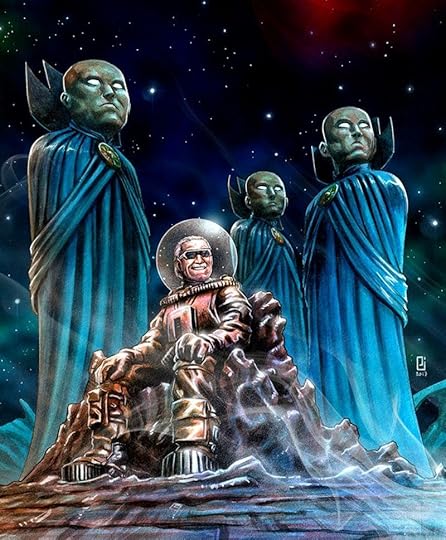
They might be the main hero, as is the case with the true first-person narrative. They might be a sidekick or a follower or some other hang-around, witnessing the events first-hand but having a lesser impact in them all. They might be some historian or chronicler that heard of the events later on, or researched them well after the fact, then finally jotted them down. They might be a sorcerer watching it all from afar through their crystal ball, or some god or other high entity looking down from their cloud.
And yet none of them are entirely reliable, nor trustworthy. The main hero may be lying to make themselves look good, or if they're truly heroic, to downplay their efforts and impact. Their follower's perception might be skewed by wide-eyed hero worship, or by grumpy cynicism and the idea that they alone see the hero's flaws. Either one of them may forget stuff. The historians will of course have a puzzle to put together with several pieces mismatched, fitting to same spots in different ways, or missing altogether. Even the truly omniscient cosmic beings may have their priorities in the wrong order, might decide to skip something interesting or important while paying inordinate attention to something we humans would find completely irrelevant, or might pick sides and praise someone in-story while beating down somebody else, and you might no longer be certain if these events happened how they did.
Sometimes there's more than one narrator. One of my long-term projects involves a knight, his squire, and their retainers going out into the wild. Each of them keeps a journal, and each one gives a different interpretation of the events - sometimes these vary wildly and it's up to the reader whom to believe. Another is narrated by an ill-educated mercenary, who can't actually write and thus has recruited this old nun to scribe it down for him - and they both have their priorities and prejudicies that occasionally clash. I feel that both stories have things to say, that I'm challenged by writing them and improve myself in doing so, and that I'm having a jolly great time with them.

And of course, the view will depend on whether the narrator is actually present in the scene or not - and allows for interesting possibilities where they show up in the middle of it. I'm still a bit proud of the little trick I did where the narrator suddenly swooped in and rescued the main heroes from a bind. If the story's been third person up until that point, this sort of a thing can make for an effective twist.
Many people say that one advantage of first-person narrative is how it gets us straight into the head of the protagonist, to hear what they think and feel what they feel. I don't know about this one. Doesn't close third-person already do it well enough? If that's all you want, then I think you may as well stick with third-person and keep it real close, like what Harry Potter does. True first person view brings with it more opportunities, outlined above, yet also the responsibility of making it seem like it was written down or told to someone long after the fact, else there's dissonance that will throw me off out of it. All too much of first-person literature fails at doing either one of these, which is a shame and a missed opportunity.
Whether you do first- or third-person, your narrative style will offer its own set of possibilities. Use them! Try new things and break new ground! Is that not what fiction is all about?
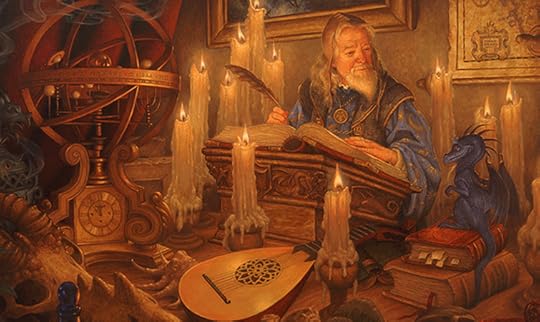

They might be the main hero, as is the case with the true first-person narrative. They might be a sidekick or a follower or some other hang-around, witnessing the events first-hand but having a lesser impact in them all. They might be some historian or chronicler that heard of the events later on, or researched them well after the fact, then finally jotted them down. They might be a sorcerer watching it all from afar through their crystal ball, or some god or other high entity looking down from their cloud.
And yet none of them are entirely reliable, nor trustworthy. The main hero may be lying to make themselves look good, or if they're truly heroic, to downplay their efforts and impact. Their follower's perception might be skewed by wide-eyed hero worship, or by grumpy cynicism and the idea that they alone see the hero's flaws. Either one of them may forget stuff. The historians will of course have a puzzle to put together with several pieces mismatched, fitting to same spots in different ways, or missing altogether. Even the truly omniscient cosmic beings may have their priorities in the wrong order, might decide to skip something interesting or important while paying inordinate attention to something we humans would find completely irrelevant, or might pick sides and praise someone in-story while beating down somebody else, and you might no longer be certain if these events happened how they did.
Sometimes there's more than one narrator. One of my long-term projects involves a knight, his squire, and their retainers going out into the wild. Each of them keeps a journal, and each one gives a different interpretation of the events - sometimes these vary wildly and it's up to the reader whom to believe. Another is narrated by an ill-educated mercenary, who can't actually write and thus has recruited this old nun to scribe it down for him - and they both have their priorities and prejudicies that occasionally clash. I feel that both stories have things to say, that I'm challenged by writing them and improve myself in doing so, and that I'm having a jolly great time with them.

And of course, the view will depend on whether the narrator is actually present in the scene or not - and allows for interesting possibilities where they show up in the middle of it. I'm still a bit proud of the little trick I did where the narrator suddenly swooped in and rescued the main heroes from a bind. If the story's been third person up until that point, this sort of a thing can make for an effective twist.
Many people say that one advantage of first-person narrative is how it gets us straight into the head of the protagonist, to hear what they think and feel what they feel. I don't know about this one. Doesn't close third-person already do it well enough? If that's all you want, then I think you may as well stick with third-person and keep it real close, like what Harry Potter does. True first person view brings with it more opportunities, outlined above, yet also the responsibility of making it seem like it was written down or told to someone long after the fact, else there's dissonance that will throw me off out of it. All too much of first-person literature fails at doing either one of these, which is a shame and a missed opportunity.
Whether you do first- or third-person, your narrative style will offer its own set of possibilities. Use them! Try new things and break new ground! Is that not what fiction is all about?

Published on June 03, 2020 03:39
•
Tags:
close-third-person, first-person, harry-potter, narrative, narrator, omniscient-narrator, omniscient-third-person, skewed-priorities, soldier-of-the-mist, the-watchers, third-person, unreliable-narrator
May 31, 2020
Boredom - stretching it in books
I got hospitalized for a leg infection yesterday. I'm just lying here with a drip in my hand and nothing to do. I'm bored out of my skull.
Of course it happened just when I was about to finish another short story, too.
Still, it inspires me too. I had this old story idea of a guy just lying ina bed with nothing to do. Difference being, where I should get out the day after tomorrow, he would have to sit there for months. Months of thinking about stuff, finding ways to pass time. Without his legs.
I bet I could stretch it for a thousand pages.
Of course it happened just when I was about to finish another short story, too.
Still, it inspires me too. I had this old story idea of a guy just lying ina bed with nothing to do. Difference being, where I should get out the day after tomorrow, he would have to sit there for months. Months of thinking about stuff, finding ways to pass time. Without his legs.
I bet I could stretch it for a thousand pages.
Published on May 31, 2020 06:11
•
Tags:
boredom, hospitals, leg-problems, story-inspiration
May 21, 2020
I wish I'd gotten a globetrotting world-saving adventure when I was 12. The farthest we went was Sweden.
Last time I played Earthbound, I made it till fourth town before losing interest. This was many years ago. Now I'm in Twoson and I'm sure I'll make it to the end this time.
I honestly think that all else being equal, twelve is the best possible age for the main character. You're old enough to be a bit more independent of your parents and other authority figures, to run around on your own and get in and out of trouble, to manage yourself in a tight place and even get into fights. Yet at the same time you're so young as to still be growing into your own person, still figuring out who you are and what you want of life - the best time for character development - still possessing that blissful and carefree attitude we all once held on to, still knowing how to laugh and how to cry and how to love... and of course, there's something tragic about how you already must take up such a burden, when you should be out playing.
This may be the best thing I like about Harry Potter, in retrospect. He started out at about the perfect age, and we got to see him grow up too.
And of course it's entirely possible the whole adventure was just a whole bunch of make-believe. Done right - ambiguously enough, where it may or may not have been, or parts of it may or may not have been - it'd be a story worth Wolfe. Alas.
I wish I was a child again, only with the full wisdom and knowledge adulthood brought me. I never could appreciate it enough the first time around.
I honestly think that all else being equal, twelve is the best possible age for the main character. You're old enough to be a bit more independent of your parents and other authority figures, to run around on your own and get in and out of trouble, to manage yourself in a tight place and even get into fights. Yet at the same time you're so young as to still be growing into your own person, still figuring out who you are and what you want of life - the best time for character development - still possessing that blissful and carefree attitude we all once held on to, still knowing how to laugh and how to cry and how to love... and of course, there's something tragic about how you already must take up such a burden, when you should be out playing.
This may be the best thing I like about Harry Potter, in retrospect. He started out at about the perfect age, and we got to see him grow up too.
And of course it's entirely possible the whole adventure was just a whole bunch of make-believe. Done right - ambiguously enough, where it may or may not have been, or parts of it may or may not have been - it'd be a story worth Wolfe. Alas.
I wish I was a child again, only with the full wisdom and knowledge adulthood brought me. I never could appreciate it enough the first time around.
Published on May 21, 2020 15:41
•
Tags:
children, earthbound, harry-potter, kid-heroes, kids, twelve, video-games
May 2, 2020
Ruminations on the Common Tongue
Any self-respecting fantasy setting has numerous different languages and means of communication, split between different cultures and nations, but more often than not there's also the "common tongue" to act as a bridge - and to make things reasonably simple for the poor author to manage. Much as I'd like to avoid this trope and bring a great many different languages to bear instead, make it a common issue for travellers... well, my stories tend to be rather too inscrutable as it is, I've been told.
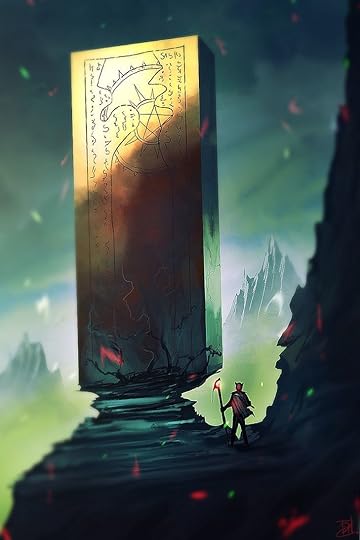
I'm dropping racial languages, though. All elves everywhere in the setting don't speak their own common "elvish". That's dumb.
So where did this common tongue come from? Many linguists suggest that it was first brought forth by an ancient and now forgotten civilization, immensely advanced and powerful, likely through means of genetic engineering: it's often encountered even in worlds that have never had any kind of outside contact in any recorded history. It's written as English for the convenience of our present-day readers and authors, but in truth it would resemble something like Esperanto - very easy to learn even in the unlikely case you were not born with innate understanding.
Strangely, it tends to also bring along an instinctive dislike - even fear and disgust - of other languages: any other spoken tongue tends to sound guttural and harsh and hideous in the ears (or other appropriate organs) of the speaker of the Language of Law. Even those that learned the language later in life, tend to pick up this prejudice. It takes some conscious effort to overcome. Why is that? Some have theorized that this ancient civilization was once at war with something else, something that simply would not accept taking up the common tongue: perhaps they instilled the subconscious hostility as a defense mechanism, or some manner of automated tribalistic response? Who can say.
Other things to note: the common tongue is spoken virtually everywhere in the galaxy of Ormuzd, whereas the other galaxy - Ahriman - has many places where it's never been heard before, especially at the farther edge. This suggests that the civilization in question would have originated from the former. More curious still, it tends to be associated with and accompanied by the vast and immensely powerful mechanical beings, the Lords of Law: beautiful and serene, golden and divine, ever the companions and guides of all civilization, ever the staunch opposers of taint and corruption. Meanwhile, in the opposite case you get the forces of Chaos: the black and ever-shifting beings, like viruses of all reality, always and everywhere seeking change and destruction for its own sake.
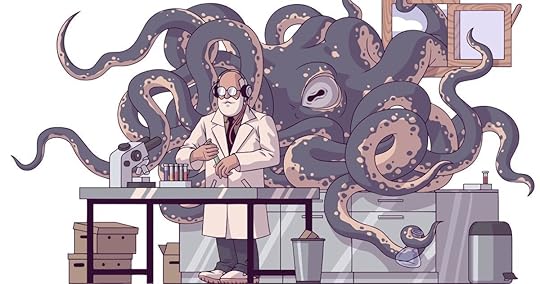
In certain less-developed worlds these forces are worshipped as gods. Even the more advanced civilizations sometimes do. But at the core of Khimari Confederate, computer scientists have found many similarities between their programs and the forces of Law, as well as many others between malign computer viruses and the forces of Chaos. Observations of some feral-world "sorcerers" also draw connections between their art, and instinctive computer programming.
Investigation continues.

I'm dropping racial languages, though. All elves everywhere in the setting don't speak their own common "elvish". That's dumb.
So where did this common tongue come from? Many linguists suggest that it was first brought forth by an ancient and now forgotten civilization, immensely advanced and powerful, likely through means of genetic engineering: it's often encountered even in worlds that have never had any kind of outside contact in any recorded history. It's written as English for the convenience of our present-day readers and authors, but in truth it would resemble something like Esperanto - very easy to learn even in the unlikely case you were not born with innate understanding.
Strangely, it tends to also bring along an instinctive dislike - even fear and disgust - of other languages: any other spoken tongue tends to sound guttural and harsh and hideous in the ears (or other appropriate organs) of the speaker of the Language of Law. Even those that learned the language later in life, tend to pick up this prejudice. It takes some conscious effort to overcome. Why is that? Some have theorized that this ancient civilization was once at war with something else, something that simply would not accept taking up the common tongue: perhaps they instilled the subconscious hostility as a defense mechanism, or some manner of automated tribalistic response? Who can say.
Other things to note: the common tongue is spoken virtually everywhere in the galaxy of Ormuzd, whereas the other galaxy - Ahriman - has many places where it's never been heard before, especially at the farther edge. This suggests that the civilization in question would have originated from the former. More curious still, it tends to be associated with and accompanied by the vast and immensely powerful mechanical beings, the Lords of Law: beautiful and serene, golden and divine, ever the companions and guides of all civilization, ever the staunch opposers of taint and corruption. Meanwhile, in the opposite case you get the forces of Chaos: the black and ever-shifting beings, like viruses of all reality, always and everywhere seeking change and destruction for its own sake.

In certain less-developed worlds these forces are worshipped as gods. Even the more advanced civilizations sometimes do. But at the core of Khimari Confederate, computer scientists have found many similarities between their programs and the forces of Law, as well as many others between malign computer viruses and the forces of Chaos. Observations of some feral-world "sorcerers" also draw connections between their art, and instinctive computer programming.
Investigation continues.
April 28, 2020
Orcs - Fantasy, Racial Familiarity, and Mundanity
I've seen a lot of discourse about fantasy racism these past couple days, especially with the context of orcs. This got me thinking about such racial matters in general. I thought I'd throw in my own two cents.
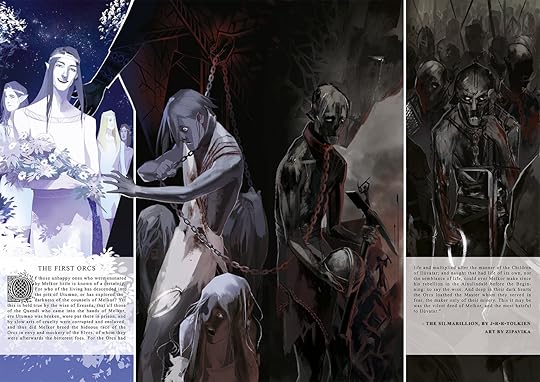
Tolkien - the father of modern fantasy - spawned his nonhuman races out of the old human mythology, fairy tales, and shared consciousness. Elves were like humans except far more magical and spiritually connected to the world; orcs were then the result of basically Lucifer himself getting his grubby hands on some elves; dwarves were the creation of a different god, dwellers under the earth, resilient as stone and greedy for gold and other shining metals; finally, the hobbits just sort of showed up, pudgy little folk with a love for idyllic life and peace, the closest to regular human. Some of them had in common with real-life nationalities and cultures - according to Tolkien himself, dwarves have more than a touch of Jewish in them, orcs Mongolian, and hobbits of course are basically British countryside dwellers - but these had a fairly minor role in their creation, helped by the man himself disliking allegory. All of them were also quite insular and had little to do with the businesses of other races: the Council of Elrond, the races coming together to address a grave issue, was an anomaly that was noted in-universe. On the whole they had strongly mythical roots, and drip with magical and fantastic flavour. All was well.
Then Dungeons & Dragons poached them into its great big fantasy patchwork. Now any player could roll up an elf, a dwarf, or ahobbi halfling; and every DM liked to use orcs as their basic mooks. Half-elves were codified into a race of their own, and soon after, so were the half-orcs... with fairly disturbing implications for the latter, at first. Gnomes were brought along from elsewhere, the enemy ranks swelled with kobolds and gnolls and others, and soon the world teemed with all manner of fantasy races great and small - and they quickly grew a familiar, even a mundane, sight in any fantasy setting.

And once you grow familiar with something, the next step is to explore and expand - to stretch its definitions, to ponder its identity, and to deconstruct what it all means. It didn't take long before the players wanted to be the orc rather than kill it, be it in a game of flipped perspectives where the whole party took up the role of the bad guys, or as a singular heroic individual who's fled home and wants to do good things, or a half-orc whose parents actually loved one another, or an orc wizard, or really just about anything else. At this stage, your imagination is the limit.
By now it seems like D&D's become the new standard bearer of fantasy - the introduction of the concept for most people, the originator of new ideas, and the wellspring of new fantasy and literature. It's next to impossible to write a fantasy story without it having been influenced by D&D in some way or the other - either by embracing it, or by consciously rejecting it. In it, magic and fantasy are a pretty standard fare, all over the place and accessible to everyone. The new races it added later on - genasi, tiefling, and dragonborn among others - followed this trend, each having their cultures and their nations and each blending in with humans just fine. It all tends towards the melting-pot feel, very much a modern concept... and indeed tied to modern sensibilities and attitudes in many other ways as well, the interpretations of morality and good and evil, the ideas of equality and inclusiveness.
All of this finally culminates to the topic of the present - racism. The big question on everyone's lips is, are orcs racist? Do they have to be racist? How to fix it?
But I reject these, and instead bring forth a whole other issue: What difference is there between these races, and plain old humans? How are they not just humans with tusks or pointed ears and other meaningless window-dressing?

The metamorphosis - the mundanization - is now complete. Through the twists and branches of a hundred-year-old evolutionary tree, the roots of mythology are now forgotten. Through intense familiarization and numerous deconstructions and parodies, the magic and fantasy is lost. "Fantasy" is no longer a description, but a genre, with medieval technology and various squat bearded and pointy-eared and green tusked people. The "orc" is no longer a strange mythical horror, he's your neighbour. The cultural counterparts and allegories, once a minor footnote, have grown to the forefront of their identity - because at this point, what else is there?
This is the great underlying issue for me - the dragon that gnaws at the tree of fantasy. I solve it by taking several big steps back. I grab all the nonhuman races and hide them back into the corners of the earth. You have to go looking for them, and therefore they remain fantastic and weird.

But where Tolkien tapped into mythology for his inspiration, I tend to look outward, into the realm of science fiction. My races tend to be substantially more different from humans, with many physical and mental traits that we might find utterly alien, just as they would never understand many facets of humanity.
Peal is not human, and I emphasize this inhumanity whenever it would be relevant. His size, his senses, his natural habitat, the faiths and superstitions drummed into him as a youth, all serve to separate him from humanity even after he's spent many years living among us. He still considers us weird or disgusting in many ways, while we in turn often find his way of thinking difficult to understand. It is a constant theme in the stories starring him - how humans might be viewed from an outsider's perspective.
I still have elves and orcs around, but you're not going to see them any more than you're going to see bugbears, which is very little indeed. I hope that I can maintain their fantastic elements forevermore.
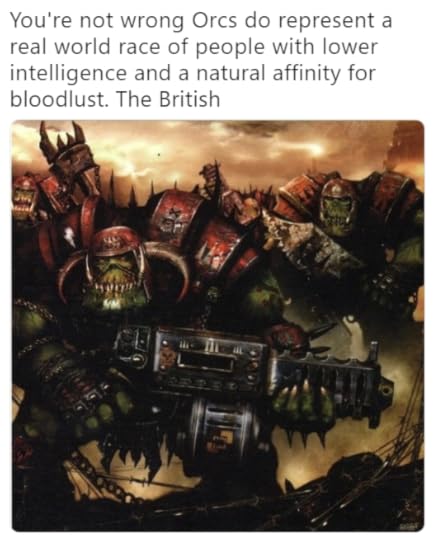

Tolkien - the father of modern fantasy - spawned his nonhuman races out of the old human mythology, fairy tales, and shared consciousness. Elves were like humans except far more magical and spiritually connected to the world; orcs were then the result of basically Lucifer himself getting his grubby hands on some elves; dwarves were the creation of a different god, dwellers under the earth, resilient as stone and greedy for gold and other shining metals; finally, the hobbits just sort of showed up, pudgy little folk with a love for idyllic life and peace, the closest to regular human. Some of them had in common with real-life nationalities and cultures - according to Tolkien himself, dwarves have more than a touch of Jewish in them, orcs Mongolian, and hobbits of course are basically British countryside dwellers - but these had a fairly minor role in their creation, helped by the man himself disliking allegory. All of them were also quite insular and had little to do with the businesses of other races: the Council of Elrond, the races coming together to address a grave issue, was an anomaly that was noted in-universe. On the whole they had strongly mythical roots, and drip with magical and fantastic flavour. All was well.
Then Dungeons & Dragons poached them into its great big fantasy patchwork. Now any player could roll up an elf, a dwarf, or a

And once you grow familiar with something, the next step is to explore and expand - to stretch its definitions, to ponder its identity, and to deconstruct what it all means. It didn't take long before the players wanted to be the orc rather than kill it, be it in a game of flipped perspectives where the whole party took up the role of the bad guys, or as a singular heroic individual who's fled home and wants to do good things, or a half-orc whose parents actually loved one another, or an orc wizard, or really just about anything else. At this stage, your imagination is the limit.
By now it seems like D&D's become the new standard bearer of fantasy - the introduction of the concept for most people, the originator of new ideas, and the wellspring of new fantasy and literature. It's next to impossible to write a fantasy story without it having been influenced by D&D in some way or the other - either by embracing it, or by consciously rejecting it. In it, magic and fantasy are a pretty standard fare, all over the place and accessible to everyone. The new races it added later on - genasi, tiefling, and dragonborn among others - followed this trend, each having their cultures and their nations and each blending in with humans just fine. It all tends towards the melting-pot feel, very much a modern concept... and indeed tied to modern sensibilities and attitudes in many other ways as well, the interpretations of morality and good and evil, the ideas of equality and inclusiveness.
All of this finally culminates to the topic of the present - racism. The big question on everyone's lips is, are orcs racist? Do they have to be racist? How to fix it?
But I reject these, and instead bring forth a whole other issue: What difference is there between these races, and plain old humans? How are they not just humans with tusks or pointed ears and other meaningless window-dressing?

The metamorphosis - the mundanization - is now complete. Through the twists and branches of a hundred-year-old evolutionary tree, the roots of mythology are now forgotten. Through intense familiarization and numerous deconstructions and parodies, the magic and fantasy is lost. "Fantasy" is no longer a description, but a genre, with medieval technology and various squat bearded and pointy-eared and green tusked people. The "orc" is no longer a strange mythical horror, he's your neighbour. The cultural counterparts and allegories, once a minor footnote, have grown to the forefront of their identity - because at this point, what else is there?
This is the great underlying issue for me - the dragon that gnaws at the tree of fantasy. I solve it by taking several big steps back. I grab all the nonhuman races and hide them back into the corners of the earth. You have to go looking for them, and therefore they remain fantastic and weird.

But where Tolkien tapped into mythology for his inspiration, I tend to look outward, into the realm of science fiction. My races tend to be substantially more different from humans, with many physical and mental traits that we might find utterly alien, just as they would never understand many facets of humanity.
Peal is not human, and I emphasize this inhumanity whenever it would be relevant. His size, his senses, his natural habitat, the faiths and superstitions drummed into him as a youth, all serve to separate him from humanity even after he's spent many years living among us. He still considers us weird or disgusting in many ways, while we in turn often find his way of thinking difficult to understand. It is a constant theme in the stories starring him - how humans might be viewed from an outsider's perspective.
I still have elves and orcs around, but you're not going to see them any more than you're going to see bugbears, which is very little indeed. I hope that I can maintain their fantastic elements forevermore.

Pankarp
Pages fallen out of Straggler's journal, and others.
Pages fallen out of Straggler's journal, and others.
...more
- Juho Pohjalainen's profile
- 352 followers



